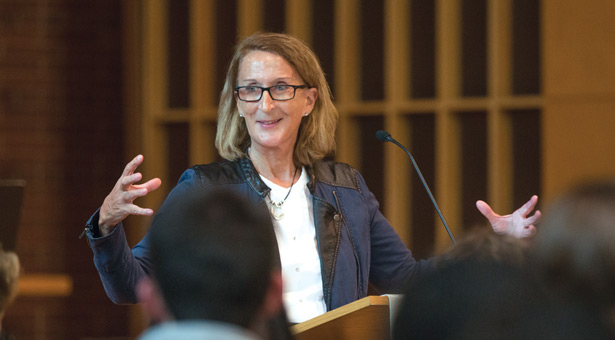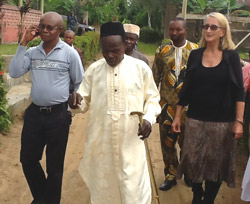Alumni A World Community
Free at Last
Missionary Phyllis Sortor ’64 Speaks of God’s Faithfulness Through Ordeal
By Hannah Notess (hnotess@spu.edu) | Photo by Mike Siegel
 Phyllis Sortor, who was honored with SPU’s Medallion Award for alumni in 2009, says that hymns and words of assurance from Scripture helped encourage her while she was held captive.
Phyllis Sortor, who was honored with SPU’s Medallion Award for alumni in 2009, says that hymns and words of assurance from Scripture helped encourage her while she was held captive.
On Monday, February 23, 2015, Phyllis Macy Sortor ’64 was standing in front of the Free Methodist church in the school compound of Hope Academy, in Kogi State, Nigeria, when suddenly, gunshots rang out, and masked gunmen appeared from every direction. They ran straight toward Phyllis, grabbed her, and began to drag her across the compound.
“Today is the day you die,” one gunman told her.
Another struck her across the face. The gunmen threw her over the wall. In moments, she was ripped from her life as a Free Methodist missionary and thrust into an ordeal that would span 12 days hidden in the forest, trapped by a group of violent criminals who were trying to extort ransom money.
The news of her kidnapping quickly made headlines around the world, and people began to pray. Friends and family gathered that night to pray in the sanctuary of Seattle’s First Free Methodist Church, Phyllis’ home church, adjacent to the Seattle Pacific University campus.
Standing in that sanctuary more than a month later to speak during an SPU chapel service, Phyllis said she felt those prayers thousands of miles away.
“The two things that sustained me throughout that terrible ordeal,” she said, “were, first of all, God’s continuous presence with me, and the second thing was the sure conviction that you were praying for me. I’m standing here as a living testimony to God’s faithfulness in answering your prayers.”
The first day of her captivity, she realized that to survive, she needed to see herself not through her kidnappers’ eyes, but for who she really was. “I’m not this weak, trembling, cowering dog,” she told herself. “I’m a strong woman. I’m a leader. I’m a Free Methodist missionary in their country, serving their people. I’m an American expat working with the governor of the state. I’m not somebody to be reviled; I’m somebody to be respected.”
 Sortor visited a possible site for a new ICCM school with pastors and local government officials. ICCM currently operates eight schools in Nigeria. Photo courtesy Phyllis Sortor.
Sortor visited a possible site for a new ICCM school with pastors and local government officials. ICCM currently operates eight schools in Nigeria. Photo courtesy Phyllis Sortor.
Born in Mozambique to Free Methodist missionaries Victor Macy ’32 and Susan Macy, Phyllis followed in their footsteps. She served in Rwanda and Nigeria with her husband, Jim, until his death in 2008. Since that time, she has worked in Nigeria, in leadership development and administration for the schools of International Child Care Ministries, the child sponsorship program of the Free Methodist Church.
Phyllis is no stranger to conflict. She helped negotiate land disputes between farmers and herders in an area where both groups rely on land for their livelihoods. She worked closely with Nigerian church leaders to strengthen their resources, and through her friendship with a group of nomadic Fulani herders, she helped bring education and economic aid to one of Nigeria’s most marginalized groups.
“She is an authentic witness to a holistic gospel — the gospel of peace,” says Celeste Cranston, director of SPU’s Center for Biblical and Theological Education.
On the day of the kidnapping, Phyllis had just been at a meeting with local officials to secure additional grazing land near the school. The project allows the cattle-herding tribe to pasture their cows on less land, reducing conflict with farmers, and ensuring children stay in one place long enough to attend school.
Reminding herself of her identity, of the prayer support she was surely receiving, and of God’s faithfulness, Phyllis waited and prayed through anxious days, while the criminal gang who held her tried to wrest payment from negotiators.
One of her captors, a man named Ismaila, became a kind of advocate for her, protecting her when others tried to attack her with knives and guns.
“There were times when I was so sick with fear that I didn’t want to eat. He would sit down beside me until I took at least three or four bites,” she says. “God gave me the opportunity to witness to Ismaila and to another kidnapper.”
After 12 long, tense days of negotiations, terms were agreed upon, and she was driven out of the forest to the edge of a nearby town.
Alone and lost, she began walking down the road. The first people she saw were a man pushing a wheelbarrow and two children. Immediately, the man said, “Congratulations! I recognize you — we’ve been praying for you!” They led her to a nearby church, where she waited to get picked up by police.
“I was overwhelmed by relief, of course, but more than that, with the sense of the unbelievable love of God,” she says. She found out that more than 100 people had been “working night and day” to rescue her.
Unfortunately, criminal groups in Nigeria continue to target foreigners and high-profile individuals in hopes of getting ransom money. The threat is real, Phyllis emphasizes, and mission organizations must tread carefully. Going forward, her Nigerian coworkers will lead the work she’s been involved in.
“It’s time for the national church to own this kind of work,” she says.
Phyllis has returned to Nigeria and is working with church leaders toward a smooth transition in the various ministries. She looks forward to spending more time with her grandchildren in the future.
She has faith that God’s work is unstoppable, and that the Nigerian church will continue it to the fullest. She asks for prayer that God will provide peace and security for her coworkers. And she hopes American churches will continue to support the schools and the children.
As for her captor, “To this day, I pray Ismaila won’t be caught,” she says. “I pray that he will find Jesus instead and live.”
